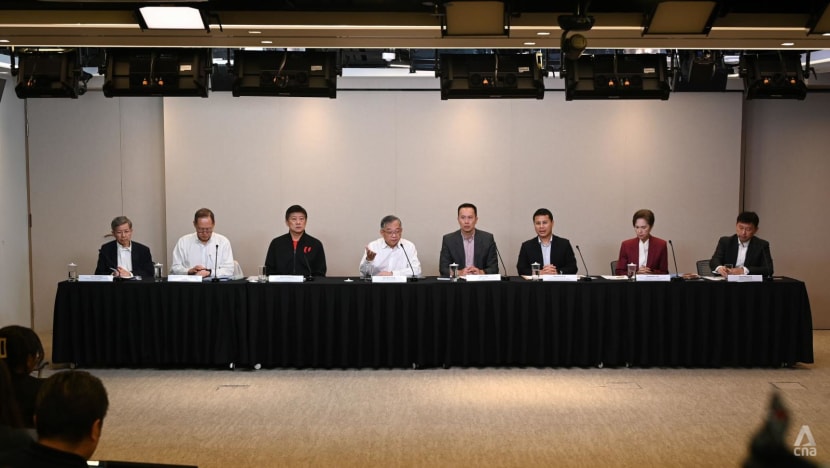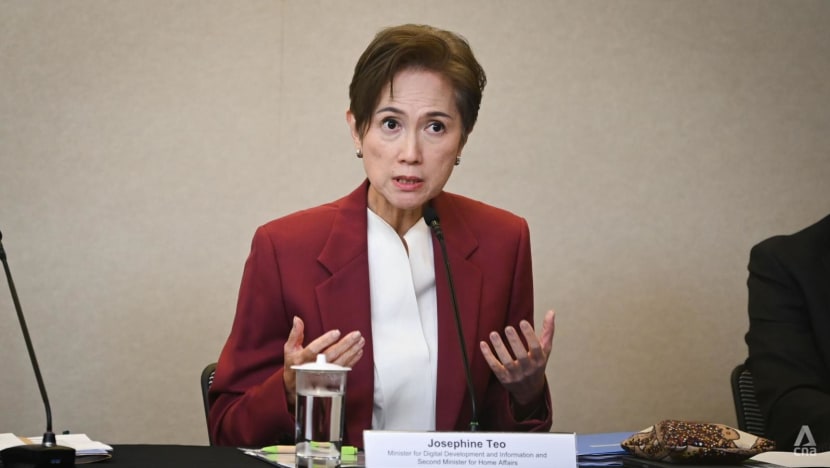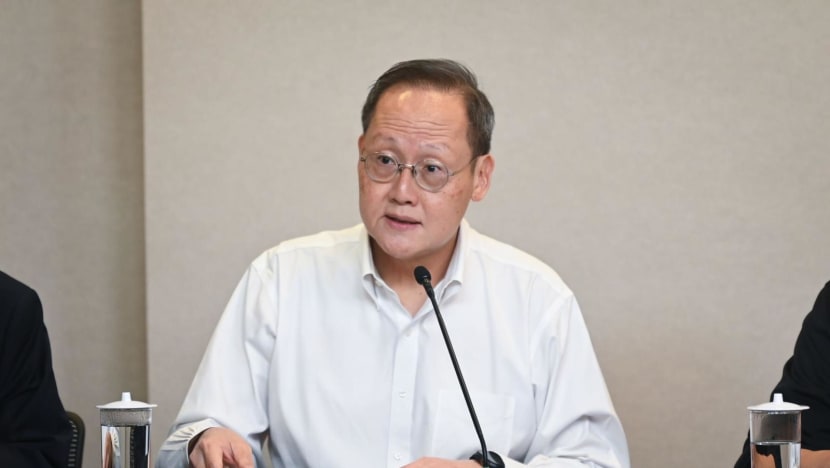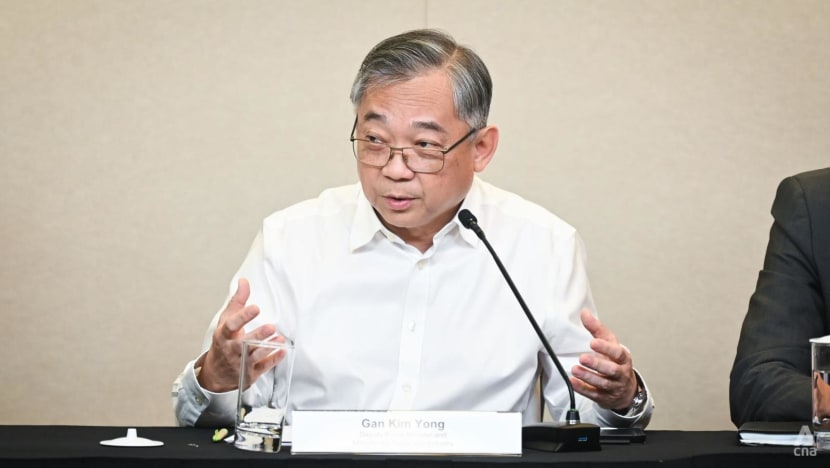Task force on US tariffs includes five ministers; will develop immediate and long-term strategies
The members will begin engaging companies and workers over the next few weeks.

The Singapore Economic Resilience Taskforce at a press conference on Apr 16, 2025. (Photo: CNA/Syamil Sapari)

This audio is generated by an AI tool.
SINGAPORE: The new task force formed in response to tariffs from the United States will include five Cabinet ministers as well as business and labour representatives.
The task force held its first meeting on Wednesday (Apr 16) and will work to address immediate challenges and develop long-term strategies.
Chaired by Deputy Prime Minister and Minister for Trade and Industry Gan Kim Yong, the task force comprises seven other members:
- Minister for National Development and Minister-in charge of Social Services Integration Desmond Lee
- Minister for Digital Development and Information and Second Minister for Home Affairs Josephine Teo
- Minister for Manpower and Second Minister for Trade and Industry Tan See Leng
- Minister for Transport and Second Minister for Finance Chee Hong Tat
- Chairman of the Singapore Business Federation (SBF) Lim Ming Yan
- Secretary-General of the National Trades Union Congress (NTUC) Ng Chee Meng
- President of the Singapore National Employers Federation (SNEF) Tan Hee Teck
Mr Mark Lee, vice chairman of SBF, represented the organisation on Wednesday as Mr Lim was overseas. The members will begin engaging companies and workers over the next few weeks.
The update on the task force comes a week after Prime Minister Lawrence Wong announced in parliament that Singapore would form a task force to help businesses and workers deal with the effects of sweeping US tariffs.
Earlier this month, US President Donald Trump unveiled a baseline 10 per cent tariff on all imports targeting countries around the world, including Singapore. Higher "reciprocal tariffs" were imposed on dozens of America's trading partners, with China bearing the brunt of the levies.
Trump later said there would be a 90-day pause on the higher tariffs, but doubled down on China.
Chinese goods now face a 145 per cent tariff in the US, while US goods face a 125 per cent tariff in China.
On Wednesday, Mr Gan said some companies in Singapore have already been affected. For example, those that have manufacturing operations in China or sell to manufacturers in China are seeing cancelled or deferred orders.
"This dangerous game of brinksmanship between the US and China also risks greater tension that can easily spill over to other countries and other areas," he said.
Singapore cannot rule out the possibility of a recession this year, Mr Gan added.
As worries loom about the impact of the tariffs on Singapore's open economy, the Ministry of Trade and Industry (MTI) downgraded its 2025 growth forecast to between 0 per cent and 2 per cent. The Monetary Authority of Singapore also eased monetary policy this week as economic fears rise.
The members of the task force were split into three groups to focus on different areas.
Sensemaking and communication:
The first group will work on assessing how businesses are being affected and sharing information on what schemes are available. It will also keep the public informed of the task force’s work.
Mrs Teo, who oversees the first group together with SBF's Mr Lim, said the task force wants to get as full a picture as possible so that it can design suitable responses.
"You don't go into this effort presuming to know what will be necessary. You have to go figure out what are the pain points that the companies are experiencing," she said.
The situation can change quickly and some confusion will remain, but the noise needs to be turned into insights so that Singapore can chart a path forward, said Mrs Teo.

Addressing immediate challenges:
The second group will focus on short-term support and developing additional measures if needed. It will be co-led by Dr Tan, Mr Tan and Mr Ng.
Dr Tan said the group will pay close attention to sectors that will be most affected – such as manufacturing, wholesale trade and semiconductors – while looking out for spillover effects on the rest of the economy.
For younger people, the immediate need is job creation and availability, while for the wider workforce, the immediate concern is job security, said Mr Ng. He added that union leaders are anxious about the uncertainty in global trade and are worried about higher production costs.
Dr Tan said there are a wide range of schemes available to support workers, and the first step is to make people aware of them.
"Let the schemes run. We have the flexibility to bring many of these schemes forward, to expand the parameters," he said, adding that support can be directed to where it is needed most.

Longer-term strategies and responses:
The last group will come up with strategies to transform businesses and workers. This will include longer-term efforts to strengthen Singapore’s status as a global hub in air, sea, trade and finance, and ensuring Singapore remains attractive to investors and talent.
Mr Desmond Lee said the task force will work with Singapore's economic agencies to explore new and innovative ways to help businesses grow, enter new markets and diversify supply chains.
The flow of goods, people and ideas shift and reorientate, and Singapore wants to be ready to seize these opportunities, he said.
"In this period of uncertainty, we will face challenges, but we can also unlock opportunities to transform our economy and to reposition ourselves globally so that Singapore remains relevant and competitive."
Mr Gan said there will be pockets of opportunity that Singapore can tap on, and the task force needs to help companies be nimble and continue investing in innovation.
"At the same time, continue to invest in our people so that they can have the skills that are necessary," he said.

THE GE FACTOR
Responding to a question whether the upcoming polls will dilute the focus of the task force, Mr Lee acknowledged that those who are standing for election have to focus on winning the mandate of the voters.
But there is an urgency to the work that the task force is doing.
"While there may be a GE, we also need to make sure that this work continues apace, because the developments are in flux," he said.
The government will be upfront about the challenges, although some may think it causes people to be overly concerned, said Mr Lee.
"We say it as it is and make sure that we prepare Singaporeans and our businesses for the journey ahead of us."
Election or otherwise, Singapore has to manage this crisis, said Mr Gan.
"As the situation evolves, we will have to make responses in a timely manner," he said, adding that forming a task force helps with this.
"I think that has been our strength in the past (and it) will continue to be our strength."

















